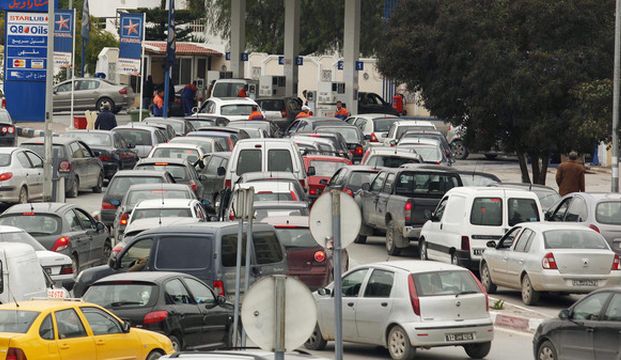
This February 8, 2011 file photo shows vehicles lining up for gasoline at a Staroil gas station in the Tunisian capital Tunis after the announcement of a strike by oil truck drivers. (AFP Photo)
Tunis, Asharq Al-Awsat—The influx of Libyan refugees is putting pressure on Tunisia’s already strained subsidies system, Tunisian officials have warned, as the number of refugees in Tunisia from the neighboring north African country approaches 2 million since 2011, according to government estimates.
Foreign Minister Mongi Hamdi said recently that the country would have “great difficulty” in hosting more refugees, adding that “the economic situation in Tunisia is not suitable for receiving more [people] fleeing the conflict in Libya.”
The steady stream of Libyan refugees since 2011 has accelerated in recent weeks as fierce fighting continues to rage between armed factions in the country’s two biggest cities, the capital Tripoli and the eastern coastal city of Benghazi.
Official news agency TAP has reported that some 5,000 refugees from Libya have been entering Tunisia every day since fighting flared up in July.
A number of commodities such as food and fuel are sold at subsidized prices to the Tunisian populace, with fuel products accounting for roughly 70 percent of the country’s entire subsidies bill.
But with no conditional or means-tested system in place in the country to control the flow of subsidized commodities to different segments of the population, officials have said that following the recent uptick in refugee numbers from Libya, the resulting increased demand on fuel products in particular will put a growing strain on the public purse.
They also said that many of the vehicles coming in from Libya were fuel-inefficient, causing them to use more fuel compared to their Tunisian counterparts, further compounding the problem.
A worker at a Tunis fuel station, who preferred to remain anonymous, told Asharq Al-Awsat there had been increased lines at his station during the last few days, with many Tunisians worried about an impending fuel shortage crisis.
He added: “The Libyans have left the oil in Libya which they could have bought at knockdown prices only to come among us [in Tunisia] to buy fuel subsidized by the [Tunisian] government; how strange.”
Some Tunisian economists have in recent weeks suggested that monthly charges of 20–30 US dollars should be levied on all Libyan refugees using subsidized fuel products in Tunisia, in a bid to counteract the losses accruing to the country’s public purse and stem a concomitant rise in food prices.
Tunisia’s spending on subsidized commodities has increased six-fold since 2010 from 950 million Tunisian dinars (600 million dollars) to 6 billion dinars (4 billion dollars) in 2014—roughly 20 percent of all public spending.
In July the Tunisian government announced it was cutting the state budget by 350 million dinars (319 million dollars)—from 28.125 billion dinars (17.578 billion dollars) to 27.775 dinars (17.259 billion dollars)—as part of a supplementary bill aimed at reducing a widening budget deficit, which is estimated to reach 8 percent of GDP by the end of the current financial year.
This included cuts to fuel subsidies, with the prices of lead-free petrol, diesel, and low-sulfur diesel raised by 6.3 percent, 6.8 percent, and 7.1 percent respectively.
Tunisia’s economy was dealt a major blow following the revolution that ousted longtime dictator Zine El-Abidine Ben Ali in 2011, when formerly lucrative sources of hard currency such as tourism dried up.
In June, the World Bank revised its growth forecast for Tunisia for the period between 2014–2016 to 2.7 percent from the 2.5 percent predicted in January.
